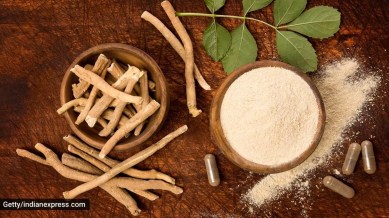Click here to join Express Pune WhatsApp channel and get a curated list of our stories
Denmark’s ashwagandha ban based on report that lacks ‘scientific rigor’, claims Ayush ministry
Report flawed, new body of evidence shows DTU conclusions irrational: J-AIM

The Ministry of AYUSH has expressed serious concern over a May 2020 report by Technology University of Denmark (DTU) based on which Denmark has banned ashwagandha, also known as the Indian ginseng or winter cherry that has been used for centuries in Asian cultures and Indian traditional medicine systems.
Withania somnifera (ashwagandha) faces safety concerns as per the DTU report which highlights potential issues such as its possible abortifacient effect, stimulation of thyroid gland and immune system, effect on sex hormones and adverse liver reactions. The same report has also raised concerns in Sweden, Finland, Australia, the Netherlands, France, Turkey and the European Union.
monthly limit of free stories.
with an Express account.
When contacted Rajesh Kotecha, secretary, Ministry of Ayush, Government of India said the report requires reconsideration. “It lacks comprehensive evaluation of ashwagandha’s diverse properties related to function and safety, and there has been substantial new evidence on ashwagandha’s safety and efficacy published since 2020 (over 400 papers and safety dossiers). Considering the lack of scientific rigor of the report and how it is taken up for subsequent banning and concerns are being raised in different countries, it is perceived as a non-tariff barrier,” Kotecha told The Indian Express.
On Friday (July 5) a scientific Journal of Ayurveda and Integrative Medicine has also published a report raising questions about the credibility of the report by DTU Food Institute which experts claim has ‘several technical, scientific, and ethical pitfalls’,
Dr Bhushan Patwardhan, National Research Professor, AYUSH, and lead author of the report told The Indian Express. As per the authors, the report is not peer-reviewed; the authors’ credentials, funding sources and conflicts of interest are not disclosed.
“The DTU report on Ashwagandha discusses its ingredients, general toxicity, effects on sex hormones and reproduction, metabolism, immune system, and central nervous system. Unfortunately, the report refers to a few articles from predatory journals in its sketchy literature review. Although the mandate from DVFA is on ashwagandha roots, it draws conclusions from studies on whole plants, stems, leaves, fruits/berries clearly irrelevant to this case,” Dr Patwardhan said. “This is a flawed report as new body of evidence shows that DTU conclusions are irrational,” he added.
“The DTU report entirely ignores the ‘benefit’ component, raising serious questions about its conclusions. Most drugs have some adverse effects but are used based on risk-benefit assessments. Banning Ashwagandha roots based on the data on the toxicity of leaves or berries is akin to banning apples because their seeds contain amygdalin which is a precursor to cyanide,”the authors said.
Meanwhile, the Ministry has also assembled a panel of experts led BY Padmabhushan Prof Dr Shiv Kumar Sarin, Dr Rajesh Khadgawat, Dr Bhushan Patwardhan and others to look into the scientificity of the report. “The expert committee is updating a detailed safety dossier of Ashwagandha based on credible scientific evidence. The DTU/ report lacks scientific rigor, contains references from predatory journals and misquotations from American Herbal Pharmacopoeia,” Kotecha said.
Scientists from University of Mississippi, USA, and from India have also published rebuttals on the flawed DTU report, Kotecha pointed out. He also said that research affirms ashwagandha’s traditional aphrodisiac properties and shows that it can increase testosterone levels within normal ranges. Regarding thyroid health, while sporadic reports mention thyroid hormone fluctuations, overall evidence suggests safety, with potential benefits for hypothyroidism. Additionally, long-term exposure to varied doses of ashwagandha has shown no adverse effects.
India leads in exports
As per data from the Ayush Ministry, India is the world’s largest producer of ashwagandha, with an estimated annual production of 4,000 tonnes of roots. India holds a dominant position, contributing 42% of the world’s supply, Kotecha said, quoting studies that show India leads ashwagandha exports with 25,608 shipments (92%), followed by the US with 498 shipments and the EU in third place with 401 shipments. The herb jumped from 34th on the list of top-selling herbs in 2018, to 7 th in 2021; and sales increased an unprecedented 225% in 2021 to reach more than $92 million in the US alone, as per data from the American Botanical Council’s (ABC’s) annual Herb Market Report.
“The safety of Ashwagandha is well-proven in various conditions through pre-clinical and clinical studies,” Kotecha said, adding that during the Covid-19 pandemic, research was conducted on ashwagandha’s potential as a prophylactic measure against long Covid-19, yielding promising outcomes. Consequently, Ministry of Ayush initiated collaboration with the London School of Hygiene and Tropical Medicine (LSHTM) to investigate ashwagandha’s effectiveness in aiding the recovery of over 2,000 individuals in the UK experiencing prolonged Covid-19 symptoms.
Click here to join Express Pune WhatsApp channel and get a curated list of our stories